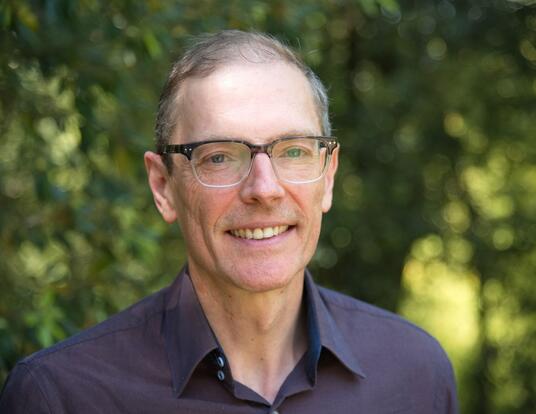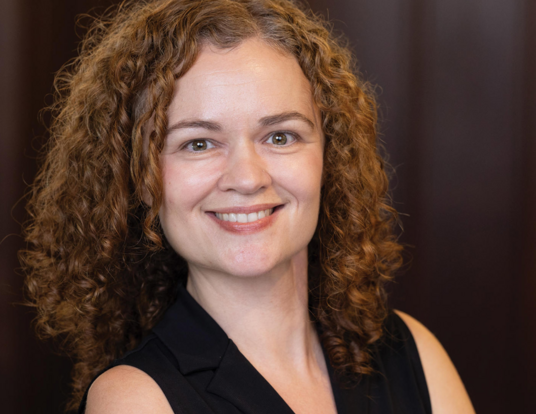Orchestrating Belonging
Led by conductor Leo Sarbanes, the Student Center Orchestra makes beautiful—and underheard—music together
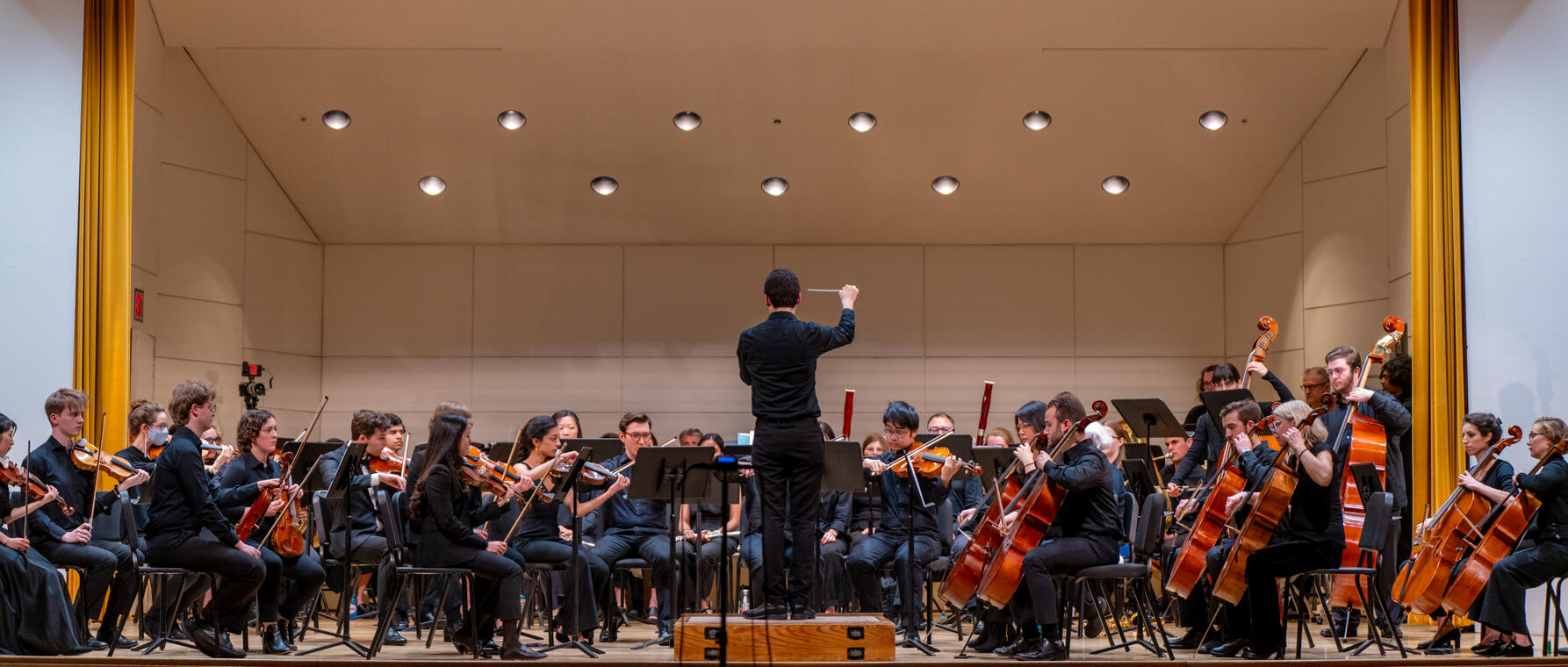
Research at Risk: Since World War II, universities have worked with the federal government to create an innovation ecosystem that has yielded life-changing progress. Now much of that work may be halted as funding is withdrawn. Find out more about the threats to medical, engineering, and scientific research, as well as how Harvard is fighting to preserve this work—and the University's core values.
Ralph Vaughan Williams’ Pastoral Symphony was inspired by the English composer’s experiences as an ambulance driver in northern France during the First World War. Near the end of the piece, a solo singer delivers a mysterious wordless melody—possibly mourning the war dead, possibly giving them a voice. As the Harvard Griffin GSAS Student Center Orchestra (SCO) performed the symphony last fall at Paine Hall, a prolonged and eerie gust of wind rumbled outside in the final moments, adding to the somber, haunting feeling Vaughan Williams’ composition elicits.
“That sound almost seemed to deliver us into the French landscape that inspired the piece, and we could even imagine that the spirits of those lost there, or of Vaughan Williams, were carried on the air,” says Leo Sarbanes, a PhD student in historical musicology and conductor of the SCO. “By putting effort and love into the music we play, we can create the conditions in which these unplanned moments might compound the magic of the performance. I’m so grateful to the musicians for that dedication.”
Effort, love, and dedication are the ways that Sarbanes brings together lovers of music—both players and listeners—as a Student Center Fellow and leader of the SCO. Through the transcendent power of works like those of Vaughan Williams and many composers from underrepresented backgrounds, he looks to break down boundaries and connect orchestra members with their audience—and with each other.
A Welcoming Environment for All
With around 75 performers, the Student Center Orchestra is open to all in the Harvard community. Musicians come to the orchestra from a wide range of backgrounds and experience levels. Some have not played for years; some are active musicians. Such a mix could present challenges for any orchestra, but Sarbanes views it as a strength. “It feels like the ensemble is a cross-section of the graduate student community and experience,” he says. “I think it gives everyone a shared sense of purpose to always be improving, no matter what level they're at, when they come to rehearsal.”
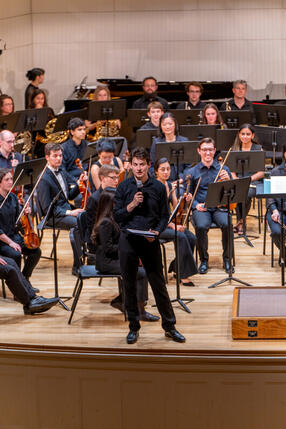
As leader of the orchestra, Sarbanes facilitates highly productive rehearsals and music-making. Sophie Everbach, a bassoonist and a fifth-year PhD student in organismic and evolutionary biology, has been in the orchestra since fall 2021. She says that playing under Sarbanes’ leadership has been both a pleasure and a challenge. “Each concert, Leo picks fun and demanding music, usually featuring some cool woodwind parts in honor of his roots as an oboist,” she says. “He makes rehearsals fun and engaging, providing all of us the communal creative outlet of making excellent music together.”
SCO bassist Matthew Dardet agrees. “Leo is not only able to bring the orchestra up to a high level of technical ability and refinement on any of the challenging pieces we play, but also he brings a unique energy and joie de vivre to rehearsals and performances,” he says.
Sarbanes combines musical rigor with a relaxed and social environment that relieves the stress and isolation students sometimes experience in graduate school. He says musicians see rehearsal as a chance to connect with others as they make music together. Orchestra members also enjoy the SCO’s concentric circles of belonging: their instrumental section, broader families like woodwinds or strings, and the group as a whole. In that way, musicians get to express their unique identities in the orchestra while sharing a collective mission.
Those connections often extend beyond rehearsing and playing. “We have grown to be rather large,” says Chip Robinson, instructor of Germanic languages and literatures and SCO oboist. “It’s rare that such a group would gather for drinks and snacks after rehearsal as we do. It’s a very good sign of a healthy intellectual, cultural, and social experience. Over time with Leo, there has been a dynamic transformation in the esprit of the ensemble and the quality of the performances.”
It feels like the ensemble is a cross-section of the graduate student community and experience. I think it gives everyone a shared sense of purpose to always be improving, no matter what level they're at, when they come to rehearsal.
—Leo Sarbanes
As conductor of the Student Center Orchestra, Sarbanes is one of the Student Center Fellows, a team of diverse leaders working to improve the lives of students at Harvard Griffin GSAS through programming and community building. In that role, he often organizes outings for SCO members. Maddie Kingan, a second-year education PhD student and a violinist, says the combination of performance and outside activities creates a welcoming, collaborative, and fun-filled environment. “From working our way through challenging repertoire to field trips to the BSO [Boston Symphony Orchestra], I've never had such a good time and met so many cool people in an orchestra before!”
Sarbanes says it’s rewarding to advocate for his fellow graduate students and help them have a meaningful nonacademic life during their years at Harvard Griffin GSAS.
“I know that people who have only attended a couple of Student Center events still get a lot out of it, maybe doing something out of their comfort zone or just getting to learn about other graduate students that share an interest,” he says. “You might have a momentary opportunity for connection over a film screening and discussion, or a dumpling-making lesson, or a rehearsal of the Student Center Jazz Band, World Music Collective, or Choir. It feels wonderful to be on the front line of fostering a more welcoming and well-rounded graduate student experience.”
Uplifting the Underheard
Just as Sarbanes looks to expand SCO members’ social circles, he also tries to expand the group’s musical repertoire, often featuring works from underheard composers. Previous programs included British women composers such as Ruth Gipps, Ethel Smyth, and Doreen Carwithen; William Grant Still’s Symphony No. 4 ("Autochthonous"), which draws on American blues and jazz traditions; and music by John Knowles Paine, the founder of the Harvard Department of Music. "I hope that playing music that is not as frequently heard, but is really exciting and accessible in its musical language, has given many players a sense of pride and ownership that they might not otherwise have felt if we were playing the 'greatest hits.' I am very thankful for their openness to this unfamiliar music,” Sarbanes says.
Oboist Robinson says he appreciates the SCO’s innovative and coherent programming. “We performed British and other women composers, Harvard figures like Paine and Piston, and now we are preparing a concert of lesser-known Cuban music for Arts First weekend,” he says.
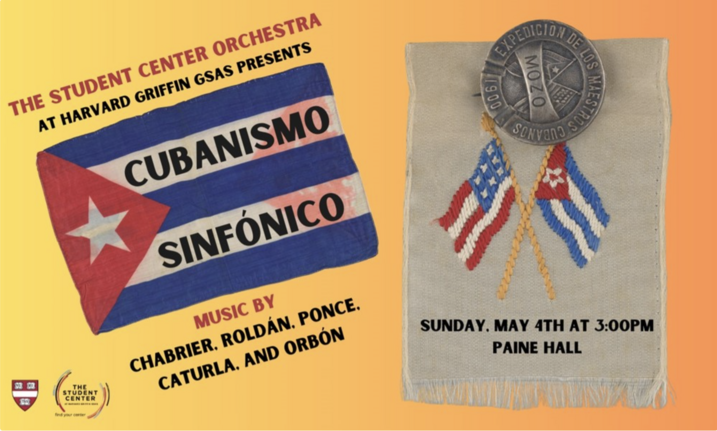
That upcoming program, to be performed May 3 and 4, has an unexpected intersection with Harvard's history: this year is the 125th anniversary of a 1900 cultural exchange program between Cuba and Harvard, in which the University brought about half of the island nation’s schoolteachers to campus for a summer session intended to teach civics and American-style pedagogy. "Recent retrospectives on this 'exchange' have highlighted its one-sidedness and its imperialist motives. But music was an omnipresent source of cross-cultural connection at the program, from student recitals for the Cuban visitors to twice-weekly receptions at which Cuban, American, and European dances intermingled. At our May concert, we will revisit those moments to introduce some of Cuba's most innovative symphonic music of the twentieth century."
It’s rare that such a group would gather for drinks and snacks after rehearsal as we do. It’s a very good sign of a healthy intellectual, cultural, and social experience.
—Chip Robinson
Sarbanes is most excited to play Amadeo Roldán’s rarely performed or recorded work, Tres Pequeños Poemas (Three Little Poems). In these musical ‘poems,’ written in 1926, the orchestra emulates the human voice to celebrate Cuba's cultural diversity. They also mimic street calls by vendors and merchants in Havana, echoing popular melodies. And the exhilarating third movement attempts to capture the influence of Afro-Cuban music. “It takes a magnifying glass to these different aspects of Cuban musical life in a thrillingly vivid way,” Sarbanes says.
The May program will be especially significant for Dardet. “It’s a fascinating experience as a musician and personally meaningful to me as someone who comes from a Cuban-American family.”
Connected by Music
As a graduate student, Sarbanes studies classical music institutions and how they serve various local and national interests, with his dissertation focusing on the relationship between orchestras and their local communities. He says he has always been drawn to music history, registering how his perceptions and experience were enhanced by knowing the story behind the music, including the background of the composer. “History allows us to expand our musical communities. Any time we listen to music, we are entering into a relationship with the original composer and all the performers and listeners who have ever experienced their work,” Sarbanes shares. “Understanding more about the circumstances in which pieces of music have been imagined, realized, and received can help us feel more connected to those people and to the sounds we are hearing.”
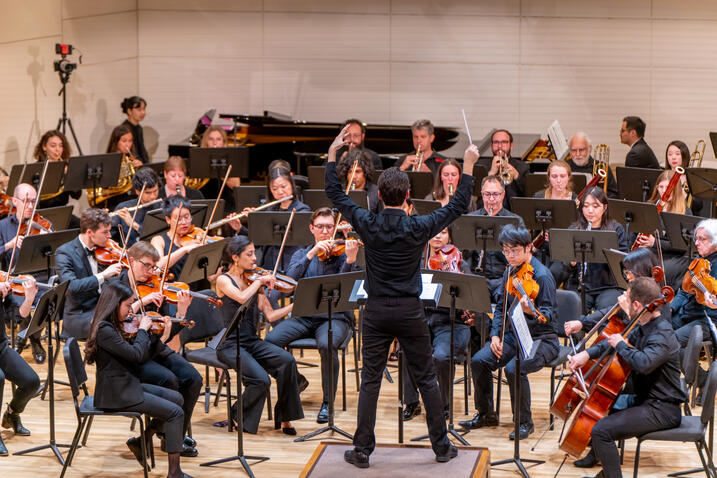
Leading the orchestra has enhanced Sarbanes’ dissertation work, providing a microcosm of the operations and priorities of larger groups. Sarbanes shares that while his research focuses on major professional orchestras, community ensembles like the SCO are the lifeblood of orchestral activity across the country. “The spirit of inclusion and fellowship among our members and our creative approach to programming have informed my advocacy for similar values in professional orchestras. Running the SCO, I have had to mobilize a diverse array of instruments and people around a larger goal. Ideally, orchestras of all levels can harness this dynamic in engaging with diverse community members to foster a thriving local music ecosystem.”
Before conducting the SCO, Sarbanes played the oboe in orchestras for nearly 15 years and developed an identity around being a part of a community of instrumentalists. As leader of the SCO, he says he’s been delighted to bring others into that community. "I get so much joy from discovering the talent that exists across our graduate schools and throughout Cambridge,” he says. “Graduate school is challenging and often isolating. Sometimes it can feel like there are limited opportunities to express ourselves beyond our scholarship. Witnessing and taking part in massive, collaborative artistic expression can be profoundly refreshing. It has inspired many listeners to join the group and inspired many of our musicians to gather separately to rehearse and perform chamber music, extending that experience and the community that makes it possible. It’s my favorite part of this work.”
The Student Center Orchestra will play a 20-minute preview of their spring program at the Harvard Arts Festival on May 3 from 3:00 p.m. to 3:20 p.m. in Paine Hall. The full Student Center Orchestra Spring Concert, Cubanismo Sinfónico, is on May 4 at 3:00 p.m., also at Paine Hall.
Get the Latest Updates
Join Our Newsletter
Subscribe to Colloquy Podcast
Simplecast



